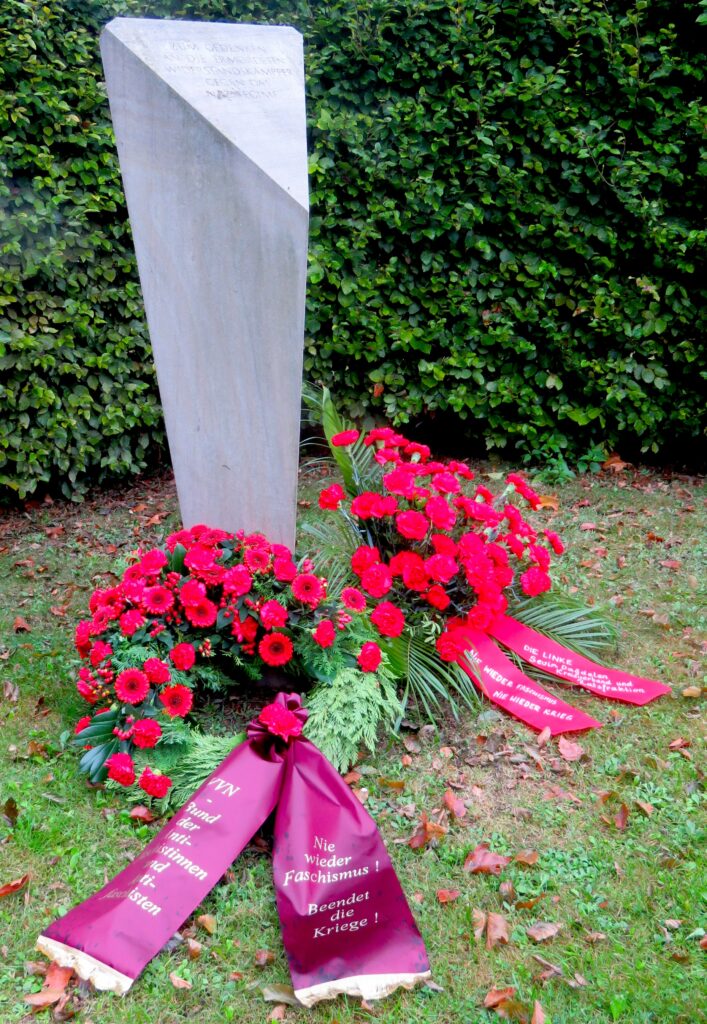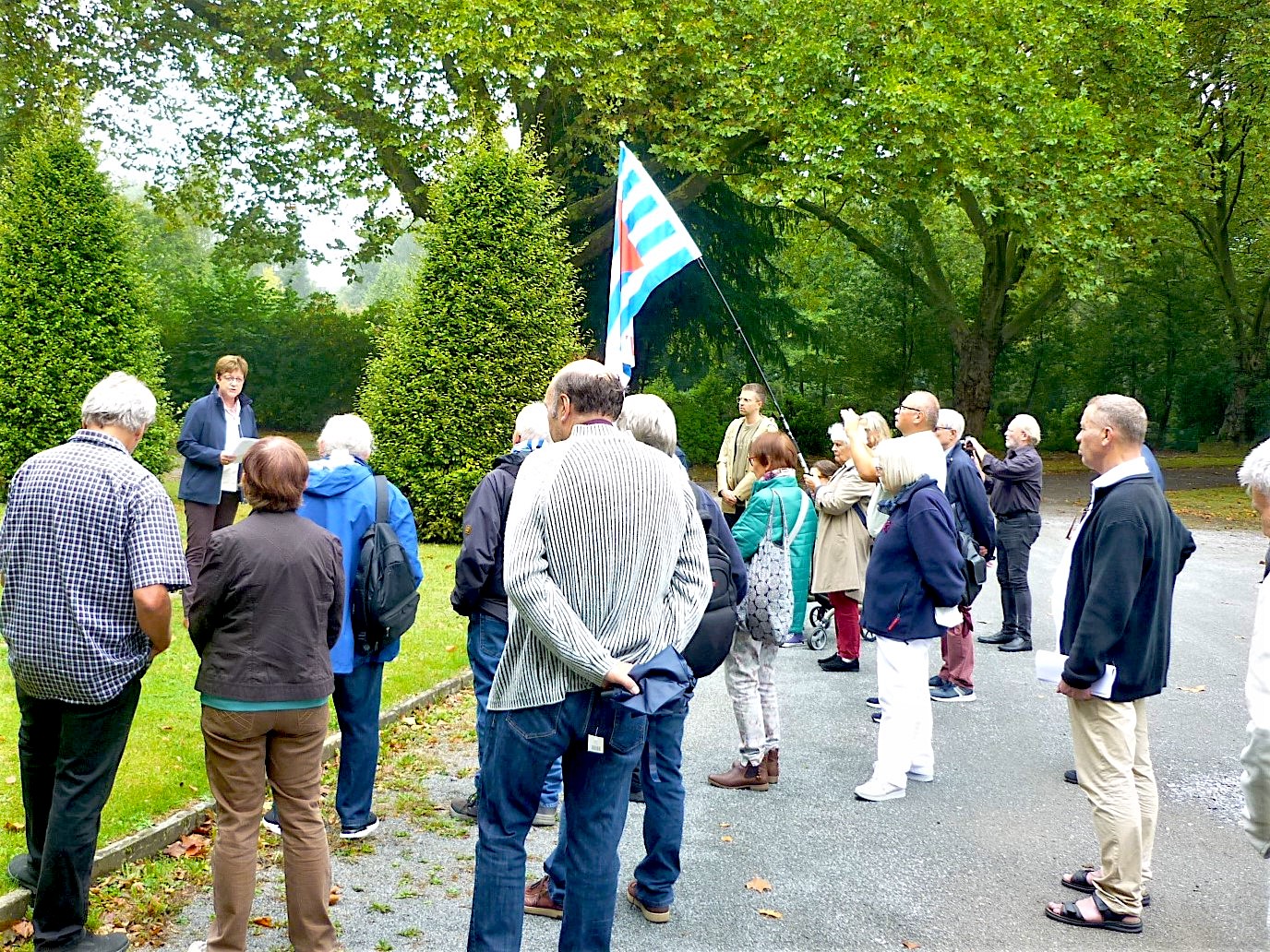12.09.2022
Spreading the stories of resistance against National Socialism
Address in memory of the victims of National Socialism
By Dr. Irmtrud Wojak
The Association of the Persecuted of the Nazi Regime – League of Anti-Fascists calls on the occasion of the Memorial Day of the Victims of Fascism to remember the murdered resistance fighters* against fascism and war. The day of remembrance was proclaimed by survivors in 1946. The commemoration ceremony took place on September 11, 2022 in front of the commemorative stone for the murdered resistance fighters at the Ehrenrundplatzes on the Freigrafendamm cemetery. This is where the urn burial of 8 fighters against fascism who were executed or perished in concentration camps took place in 1947. Among them were Moritz Pöppe and Johann Schmidtfranz, who had led a large resistance group against war and fascism in Bochum in 1943/44 and were executed in the Brandenburg-Görden prison in November 1944. This year’s speaker was Dr. Irmtrud Wojak, founder of the Fritz Bauer Forum in Bochum and managing director of the non-profit BUXUS STIFTUNG. – The ed.
 Dear friends,
Dear friends,
Many thanks to the Association of the Persecuted of the Nazi Regime – Association of Anti-Fascists for remembering the resistance fighters against National Socialism here today. I feel this to be an honor and also an increasingly urgent necessity to together keep this memory alive.
It is a particular pleasure for me to do so this year in view of the Fritz Bauer Forum, which is being built in the immediate vicinity of this memorial site. A center for human rights that is now being built in Bochum and for which we laid the foundation stone a year ago. The Fritz Bauer Forum will be a place of research and encounter, of art and exchange, of learning and yes, I would like to emphasize this at this place in memory of the resistance fighters against National Socialism, also of joy. Please let me take a brief look back for this.
Perhaps it is symptomatic that I do not know the personal history of the brave people who are buried here and whom we remember here today. Frankly, I have not yet had the opportunity to delve more deeply into this history, which is one of the important themes of the VVN-Bund der Antifaschist*innen and which should become much better known.
But when Wolfgang Dominik invited me to speak here today, these questions came to my mind, as they have often in recent years:
Why do fewer and fewer people actually know and speak about the stories of resistance to National Socialism? With the exception, perhaps, of the stories of the Scholl siblings and Oberst Claus Schenk Graf von Stauffenberg, known through major motion pictures, and more recently Georg Elser.
What has happened that the history of the resistance continues to be marginalized or perhaps pushed into oblivion within the framework of our culture of remembrance? After all, the fact that only too few people were involved cannot be a reason to forget them – on the contrary. I am thinking of the resistance and self-assertion of the persecuted Jews, the communist and social democratic resistance, the Christian-motivated resistance and, in general, that of rescuers and helpers.
Do we have to start thinking about the topic of resistance anew? About what resistance actually is and means, what this has to do with ourselves?
I also immediately thought of what Fritz Bauer said, for what reason he had returned to the Federal Republic after thirteen years of exile, almost exactly with the enactment of our Basic Law. “I returned,” he explained, “because I believed I could bring something of the optimism and faith of the young democrats in the Weimar Republic, something of the émigré’s spirit of resistance and will to resist in the struggle against state injustice. (…) I wanted to be a jurist who did more than lip service to law and justice, to humanity and peace.”
With this unbroken, combative sense, the Social Democrat, who had fought against the Nazis from the beginning and was chairman of the non-party Republic Protection Organization Reichsbanner Schwarz Rot Gold in Stuttgart, who had been imprisoned in a concentration camp and had endured years of persecution in Denmark under National Socialist supervisory administration, returned to Germany.
No one called him back; at that time, emigrants and returnees were defamed as traitors to the fatherland. That Bauer nevertheless wanted to return was in the hope that he could help with a fundamental new beginning and contribute to the urgently needed “intellectual revolution of the Germans”. The jurist considered the confrontation with the roots of National Socialism to be unavoidable. The Germans should “hold court” over themselves, he said, over the dangerous factors in their history, over everything that was inhumane here.
But have we understood or interpreted Fritz Bauer’s concerns correctly?
That the majority of Germans after 1945/49 did not want to be reminded of the resistance sounds almost like a truism today. Likewise, the smooth integration of the Nazis is generally regarded as the greatest success of Konrad Adenauer’s government, the foundation of our “successful democracy” and the “success story of the Federal Republic of Germany.”
After all, who wanted or wants to seriously deal with one’ s own bad conscience? The vast majority preferred to see themselves as victims – and possibly still do today. As victims of the war, the bomb terror, the expulsion of millions. In our case, ultimately as victims of a National Socialist leadership with which they had run and which they had followed, in whose name they had forced people out, robbed them and – orders are orders and the law is the law, was one of the popular excuses of the Nazi perpetrators in the trials – they had killed millions of people.
From the point of view of the Social Democratic resistance fighter and human rights advocate Fritz Bauer, this was and still is our heaviest burden. As if, he criticized the old-fashioned subservient attitude in the majority of postwar society, there had not been millions of convinced National Socialists who wanted to help their conviction and beliefs to victory.
Bauer held up a mirror to Germans who wanted to duck behind their own history, into which they did not want to look. Perhaps out of fear or anxiety about the personal consequences that could have resulted. The lawyer admitted this without hesitation in conversation with students when asked what we could then be proud of. To add immediately that we can only be proud of something we have done and created ourselves.
Let me conclude with this. Fritz Bauer’s life and work have now accompanied me for several years. In fact, however, I have only gradually become fully aware of what the phrase that he returned because he wanted to do more than just lip service to justice, humanity and peace has to do with us and with me. The pivotal points in Fritz Bauer’s life were self-doing and decision-making. The jurist did not let himself being held back and he provoked the bad conscience by confronting the society with all details of the crime of the so-called “Final Solution of the Jewish Question” through the Nazi trials. But above all by making it clear that there are always alternatives to blind obedience and to conformity. He saw the roots of National Socialist actions in authoritarian state belief and a lack of civil courage. With all his strength, he campaigned for the recognition of the resistance in terms of state law and politics.
For Fritz Bauer, whose aim it was that young people should learn to live self-confidently and more freely, who did not spare himself in the process, the lesson of the Nazi trials was “that there is a limit in our lives where we are no longer allowed to participate.” For him, the decisive lesson of all the trials of Nazi perpetrators was:
“You should have said ‘No!'”
Today we know, part of obedience and conformity is that the self-sacrifice involved can be directed not only against oneself but also against others. One’s own weakness and mistakes are suppressed as pain and are directed against other people in the form of the anger accumulated as a result. It is the fear of this pain that repeatedly becomes people’ s betrayal of others. It leads to the willingness to make false compromises and to align oneself with the seemingly stronger and more powerful, instead of resisting and rejecting conformity and being a follower.
The few who have the courage to stand up against war, fascism and human rights violations are therefore our models and our motivation. Through people who live empathy and who share the suffering of others through their actions – like Fritz Bauer and the resistance activists we commemorate here today – peace and social justice remain vital, no matter where in the world, and humanity remains alive. We owe thanks and recognition to the resistance fighters, but above all this is and remains our own task.
Photos: Header image ©Günther Gleising, image in text ©Michael Niggemann.
PD Dr. Irmtrud Wojak, is a historian and founder of the Fritz Bauer Forum in Bochum, she is the executive director of the non-profit BUXUS STIFTUNG.
Guided tours can be booked at: info@buxus-stiftung.de and information on dates can be found on the Fritz Bauer Forum’s events website.
Book tip: Irmtrud Wojak. Fritz Bauer. A Biography. Eschenlohe: BUXUS EDITION, 2019.






